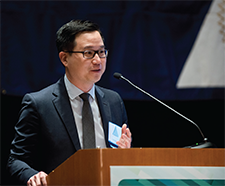The Maureen Hannley Thesis Award was established this year to honor Dr. Hannley’s legacy and contributions to the Triological Society. As the diversity of the academic and scientific work of the otolaryngology community evolved, Dr. Hannley acknowledged the importance of alternative scholastic contributions to the society, those that fall outside the traditional realms of basic and clinical research. The award will be presented annually to a candidate whose thesis represents an outstanding contribution in the alternative science category of technology/procedure development, otolaryngology status and trends, health services research, or historical perspectives.
Explore This Issue
July 2016
Paul Hong, MD
As the first recipient of the Hannley Award, Dr. Hong gave a special acknowledgement to Dr. Hannley, who provided feedback on his thesis.
He defined shared decision making as the process by which the provider and patient work together and share information. Shared decision making is especially important in situations with more than one treatment option, “preference-sensitive” conditions, and/or little evidence to support one choice over another. In an acknowledgment of the large variation in medical practice, shared decision making allows for the incorporation of patient values and preferences into the medical conversation. Not surprisingly, shared decision making is emerging as an area of research associated with measures of quality and patient-centered care.
Dr. Hong explained that some physicians are reluctant to engage in shared decision making. Often, these physicians justify their stance by asserting that patients are not interested in decision making. Dr. Hong proposed an alternative possibility: Many physicians do a poor job of identifying patient preferences.
His study included 65 consecutive patients who completed the decisional conflict scale (DCS), which reflected their uncertainty about the decision of whether or not their child should have surgery. Dr. Hong reported that 33% of patients scored 25 or higher on the DCS, indicating that they were experiencing significant decisional conflict. Further analysis of the population revealed that parents who believed they were engaged in the decision making had lower levels of decisional conflict, as well as less decisional regret.
Thus, shared decision making not only benefits the patient, but it may also strengthen health systems by improving quality of care and increasing patient satisfaction. While the results of the study are intriguing, there are still many unanswered questions in the field of shared decision making. For example: Which interventions are most likely to increase parents’ involvement in decision making? Is it possible to quantify the effects of significant decisional conflict and decision regret on health outcomes?